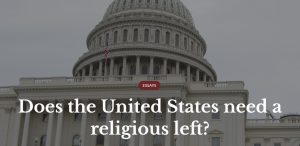Nadia Marzouki in The Immanent Frame:
 Amid the global rise of the Christian right, some intellectuals and politicians have emphasized the need to affirm a stronger religious left in the United States. The Democrats’ downfall in 2016, this argument goes, has shown the limits of ideological platforms that ignore matters of faith and belonging and stick to technocratic and secular jargon. From this perspective, in order to win the culture war against right-wing evangelicals, progressives urgently need to include religion in their strategy.
Amid the global rise of the Christian right, some intellectuals and politicians have emphasized the need to affirm a stronger religious left in the United States. The Democrats’ downfall in 2016, this argument goes, has shown the limits of ideological platforms that ignore matters of faith and belonging and stick to technocratic and secular jargon. From this perspective, in order to win the culture war against right-wing evangelicals, progressives urgently need to include religion in their strategy.
Since 2016, various attempts have been made at mobilizing religious progressives against the religious right. Vote Common Good, a group of progressive Christians, has worked toward bringing evangelicals closer to the Democratic Party. Senator Cory Booker (D-NJ) insistently speaks about his faith and how it inspires his political project. Journalist Jack Jenkins has suggested that Booker could be “a candidate for the ‘religious left.’” It has become quite trendy to blame Democrats and the liberal left for neglecting the importance of religion for the people, and to encourage progressives to try and emulate the political methods of right-wing populists and the religious right.
Such sudden injunctions to mobilize religion for political gains ignore the fact that progressive and radical religious movements have been a key part of social and political activism throughout American history—from the Social Gospel movement to the civil rights movements, to activists inspired by liberation theology, to Catholic Nuns today advocating for equal access to health care. More specifically, the now fashionable call to speak or act religious for political gains poses at least three problems.
More here.
